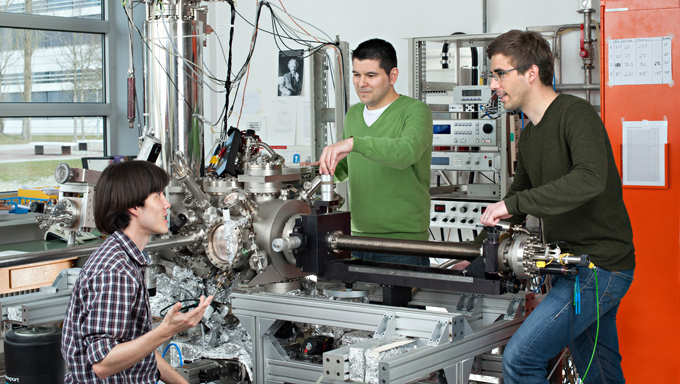Masterstudiengang Physik (Physik der Kondensierten Materie)

Der Forschungsbereich Kondensierte Materie steht für eines der reichhaltigsten Gebiete der Physik. Im Zentrum des Interesses steht eine Palette von faszinierenden Phänomenen, die durch das komplexe Zusammenspiel und die räumliche Organisation einer Vielzahl von atomaren oder molekularen Konstituenten bestimmt werden. Das Verständnis und die Kontrolle der untersuchten Materialsysteme, Grenzflächen und Nanostrukturen stellt höchste Ansprüche an die Experimentierkunst sowie die theoretische Beschreibung. Mit dem gewonnenen Wissen werden insbesondere neuartige Eigenschaften für massgeschneiderte Funktionsmaterialien und Bauelemente erschlossen.
Masterstudierende am Physik-Department der TUM starten in ein individuell zugeschnittenes Programm über fortgeschrittene Themen der Physik kondensierter Materie – sowohl aus der Perspektive der Grundlagenforschung heraus als auch hinein in die Erforschung neuer Materialien und Anwendungen. Sie tauchen tief in die Details der Materialphysik ein, um zu erkennen, wie Materialien auf atomaren, molekularen und Nanometer-Skalen maßgeschneidert werden können. Dabei kommen Bottom-up- und Top-down-Nanofabrikationsmethoden zum Einsatz, um faszinierende Quantenphänomene zu offenbaren, die für neuartige Technologien eingesetzt werden können. Weitere Themen im Studium sind ultraschnelle Prozesse in Atomen und Molekülen auf Zeitskalen von Atto- und Femtosekunden, harte und weiche Materialien sowie Konzepte und Bauteile, die in der modernen Physik der kondensierten Materie zum Einsatz kommen.
Physik (Physik der kondensierten Materie) ist ein zweijähriger Masterstudiengang, um Studierende an die aktuelle Forschung und neue Entwicklungen in der Physik der kondensierten Materie heranzuführen.
Spezialisierungsmöglichkeiten
Studierende können sich in einem oder mehreren Bereichen ihrer Wahl spezialisieren:
- Fortgeschrittene Festkörperphysik
- insbesondere fortgeschrittene statistische Physik und Festkörpertheorie, Untersuchung von Korrelationsphänomenen und Magnetismus, Untersuchung der elektronischen Struktur von Festkörpern, fortgeschrittene experimentelle und theoretische Halbleiterphysik, Halbleiterelektronik und photonische Bauteile, Physik von Grenzflächen und Oberflächen, Magnetismus und Magnonik auf der Nanoskala, Quanten-Vielteilchen-Theorie, Spin-Physik und Spin-Elektronik, Supraleitung und Physik bei tiefen Temperaturen, topologische Isolatoren, Graphen und zweidimensionale Materialien.
- Experimentelle Techniken, Numerische Methoden und Simulationsmethoden
- insbesondere Festkörperspektroskopie, Neutronenphysik, moderne Physik mit Röntgenstrahlen, fortgeschrittenen Materialanalyse mit Synchrotron-Strahlung, magnetische Messmethoden und Nano-Wissenschaften mit Rastersondenmikroskopie.
- Physik der Nanowissenschaften
- insbesondere Nanosysteme, Nanomaterialien, nanostrukturierte harte und weiche Materialien, Oberflächen und Effekte auf der Nanoskala, insbesondere mit Blick auf das Verständnis fortgeschrittener Konzepte für nanoelektronischer und nanophotonischer Systeme und Bauelemente.
- Quantenoptik und Nanophotonik
- insbesondere Quantenoptik, Ultrakurzzeit-Physik und die Attosekunden-Skala, Optik von nanostrukturierten Materialien, Plasmonik, nanostrukturierte photonische medien, Erzeugung und Einsatz von kohärenten Lichtquellen von Infrarot- bis Röntgenstrahlung, photonische Bauteile, Optoelektronik und die Physik ultrakalter Quantengase.
- Physik Weicher Materie
- insbesondere Polymerphysik, nanostrukturierte weiche Materialien.
Curriculum
Der Masterstudiengang Physik (Physik der kondensierten Materie) folgt im Curriculum der einheitlichen Struktur der Physik-Masterstudiengänge. Die Studierenden werden bei der individuellen Ausgestaltung des umfangreichen Wahlbereichs durch eine Mentorin oder einen Mentor unterstützt.
Typische Studienpläne
Die folgenden Curricula geben beispielhaft wieder, wie das erste Studienjahr im Masterstudiengang Physik (Physik der kondensierten Materie) konkret aufgebaut sein kann.
Angewandte Festkörperphysik
| Module | Turnus | CP |
|---|---|---|
| Theoretische Physik | ||
| PH1001 Theoretische Festkörperphysik | WS | 10 |
| Spezialfächer | ||
| PH2033 Magnetismus | WS | 5 |
| PH2155 Halbleiterphysik | WS | 10 |
| PH2157 Angewandte Supraleitung: Josephson-Effekte, Supraleitungselektronik und Supraleitende Quantenschaltkreise | SS | 10 |
| PH2034 Spinelektronik | SS | 5 |
| Proseminar, Fortgeschrittenenpraktikum und Nichtphysikalische Wahlfächer | ||
| Beratung durch Mentor(in) | 4 + 6 + 8 | |
Nanowissenschaften
| Module | Turnus | CP |
|---|---|---|
| Theoretische Physik | ||
| PH1001 Theoretische Festkörperphysik | WS | 10 |
| Spezialfächer | ||
| PH2169 Strukturierte Photonische Nanomaterialien | WS | 5 |
| PH2071 Grundlagen der Oberflächen- und Nanowissenschaften | WS | 5 |
| PH2048 Nanostrukturierte, Weiche Materialien 1 | WS | 5 |
| PH2173 Nanoplasmonik | SS | 5 |
| PH2072 Aktuelle Themengebiete der Oberflächen- und Nanowissenschaften | SS | 5 |
| PH2049 Nanostrukturierte, Weiche Materialien 2 | SS | 5 |
| Proseminar, Fortgeschrittenenpraktikum und Nichtphysikalische Wahlfächer | ||
| Beratung durch Mentor(in) | 4 + 6 + 8 | |
Weiche Materie
| Module | Turnus | CP |
|---|---|---|
| Theoretische Physik | ||
| PH1001 Theoretische Festkörperphysik | WS | 10 |
| Spezialfächer | ||
| PH2046 Polymerphysik 1 | WS | 5 |
| PH2048 Nanostrukturierte, Weiche Materialien 1 | WS | 5 |
| PH2053 Physik mit Neutronen: Grundlagen | WS | 5 |
| PH2047 Polymerphysik 2 | SS | 5 |
| PH2049 Nanostrukturierte, Weiche Materialien 2 | SS | 5 |
| PH2182 Moderne Röntgenphysik oder PH2054 Physik mit Neutronen 2: Anwendungen | SS | 5 |
| Proseminar, Fortgeschrittenenpraktikum und Nichtphysikalische Wahlfächer | ||
| Beratung durch Mentor(in) | 4 + 6 + 8 | |
Individuelles Curriculum
| Module | Turnus | CP |
|---|---|---|
| Theoretische Physik | ||
| Katalog, Beratung durch Mentor(in) | WS | 10 |
| Spezialfächer | ||
| Katalog, Beratung durch Mentor(in) | 30 | |
| Proseminar | ||
| Katalog, Beratung durch Mentor(in) | 4 | |
| Fortgeschrittenenpraktikum | ||
| Katalog, Beratung durch Mentor(in) | 4 | |
| Nicht-physikalische Wahlfächer | ||
| Katalog, Beratung durch Mentor(in) | 8 | |